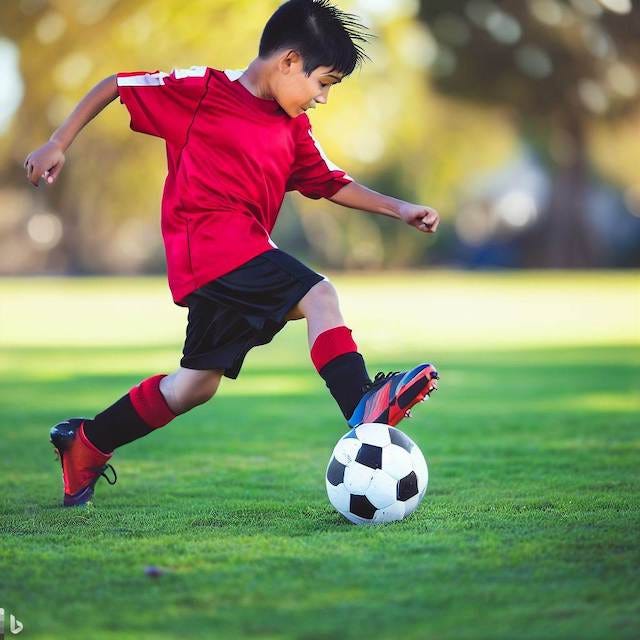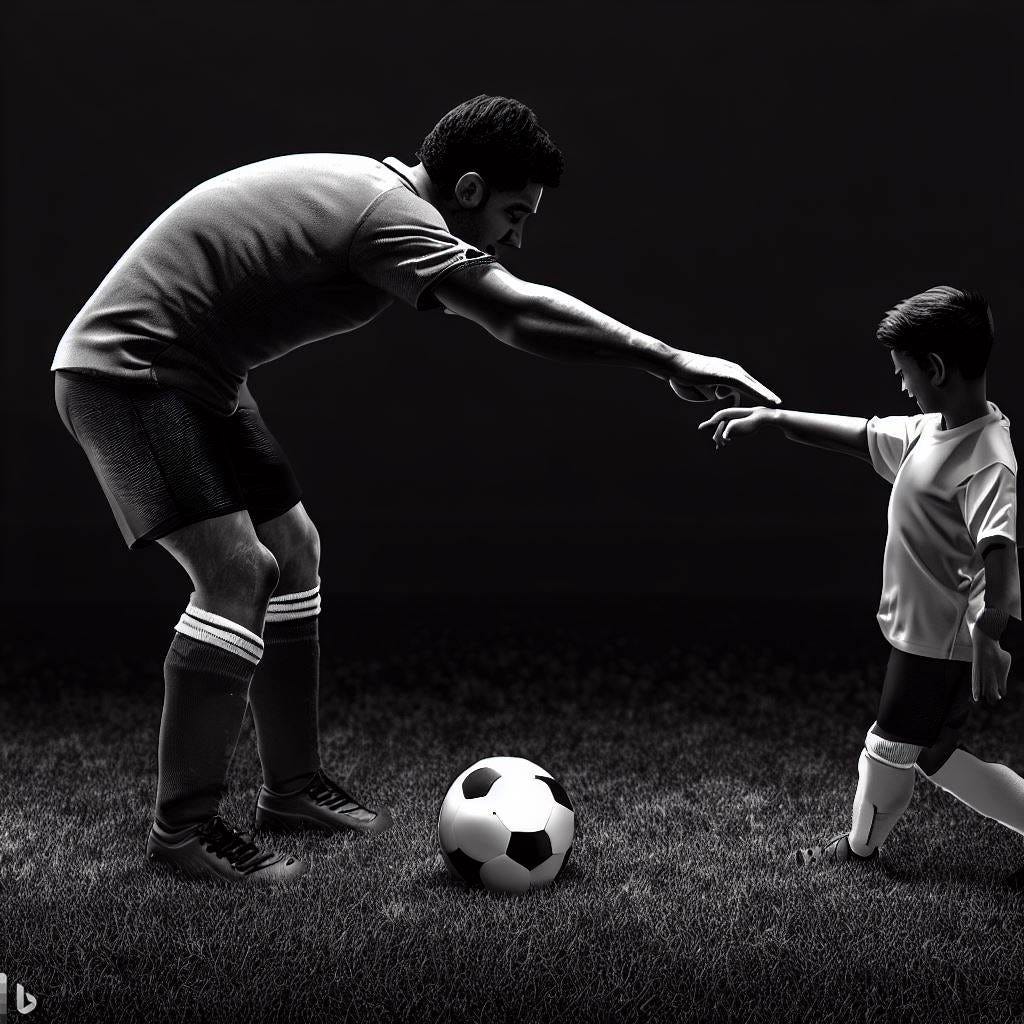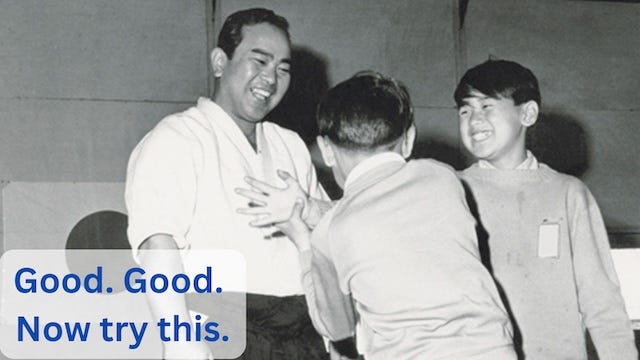How not to teach soccer (or anything else you want your kid to love)
Parenting Matters #58
By: Catherine Lynch and Glenn Collins
Dear Awesome Parent,
It’s almost summer! Soon you’ll see your kids more and have even more opportunities to correct their behavior. There are lots of ways to do that of course, but that would be a whole book and we don’t have time for that (and neither do you), so here are the two main ways of correcting your kids: the ‘make them feel good and want to hang out with you even more’ way, and the ‘make them feel bad and avoid you’ way. Please enjoy these two real-life stories that illustrate both ways, and their outcome.
“No! You’re doing it wrong.”
Our kids are from Guatemala where soccer is the national sport. Just about everyone plays and they started learning as soon as they could walk. It was part of their lives almost every day. They brought this love of the game with them when they came to live us and have transferred it to their kids. Almost all of our twenty grandkids (yes you read that correctly: 20 grandkids! 😀) play soccer to some extent. From casual backyard play all the way to being on a travel team. One of our sons (who has more than a little bit of perfectionism) was thrilled when his son showed an early interest in soccer. He decided to help his son be a better player by coaching him at home. We have a big backyard, so it was often the site of impromptu soccer practice. We got to witness his coaching first hand. It usually went something like this:
“No, stop the ball before you kick it!”
“No, no, no, not that way, dribble with the side of your foot, not the toe!”
“You have to put your leg into it to get the ball to me.”
“Keep your eye on the ball.”
“Pay attention! You’re not concentrating.”
Nothing our grandson did was right. Every time he touched the ball there was a “No” or “Not that way.” from his father. With each correction, our son would become more exasperated and our grandson less enthusiastic. It usually ended up with our grandson barely making any effort and wanting to quit.
After a while we noticed the backyard practice sessions had stopped, so we asked our son if our grandson had lost interest in soccer. “No,” he said “he still loves soccer but he refuses to practice with me. I don’t get it. I’m just trying to help him get better.”
We could see the problem (and we’re sure you can too): too much negative feedback. Being only 5, our grandson loved playing soccer. Running after the ball. Kicking it. Trying tricks he’d seen. Imagining he was Christiano Ronaldo (his favorite player). Scoring goals. In short, he wanted to be playing and having fun, not constantly being told that he was doing it all wrong. Of course he didn’t want to “practice” with his father!
“Good. Good. Now try this.”
Contrast that style of teaching with this one: I (Glenn) am a student of the Japanese martial art Aikido. It’s not an easy art to learn. At first, just about everything you do is wrong, and there are lots of corrections. It’s not unusual for new students to become discouraged. I was very fortunate that my teacher had picked up his teaching style from one of Aikido’s best instructors: Koichi Tohei. He was a very skilled martial artist, but what truly set him apart was his skill as a teacher. The things that impressed my teacher the most was Tohei Sensei’s method of offering corrections. Instead of being negative and saying something like “No, not that way” he would say “Good. Good. Now try this.” He did this no matter how poorly the student had performed the technique. He was always positive, enthusiastic, and supportive. My teacher remembers getting off the mat after training with Tohei sensei feeling energized and more enthusiastic than ever about his training.
When you compare these two teaching methods, our son’s constant “No, you’re doing it wrong” vs. Koichi Tohei’s “Good, good. Now try this.” you can clearly see the difference: How the corrections made the learner feel. Our grandson felt bad and didn’t want to practice soccer with his father anymore. Glenn’s Aikido teacher felt good and wanted to practice martial arts with his teacher even more.
So, how do you teach your kid all of the things? From tying their shoes to healthy eating habits to what it means to be a good person? They will do it wrong. All. The. Time. And there will be lots of corrections. Lots of frustration. (For both of you.) But you’re the parent, so you get to decide if you’re mostly a “No, you’re doing it wrong” kind of parent, or mostly a “Good, good, now try this” kind of parent.
Is the “Good, good. Now try this.” approach always appropriate? Of course not. When your kid is doing something that’s really outside your values like hitting a sibling, bullying a classmate or making racist comments, a “No, stop doing that.” type correction is called for. But as with everything in your relationship with your kid, save the negative for the truly important things. For lesser matters, corrections that preserve or strengthen your connection will serve you better because a strong connection is the key to maintaining your influence as your kid gets older.
Here’s some things to consider when you feel like correcting your kid:
Choose your battles. Is this truly worthy of being corrected?
Choose your timing. Does it need to be addressed right now? Or would they be more receptive later when they’re calmer, and you are too?
Choose to connect. Does your kid take a correction better if you connect with them first? “First connect, then correct” is a mindset that works for many parents.
Choose your correction style: Does their action or behavior require a negative correction or will something like “Good, good, now try this.” work?
Home practice:
Role play both styles of correction with your spouse/parenting partner.
Talk it over with your spouse and agree that sometime in the next few days each of you will correct something the other person does using the “No, you’re doing it wrong.” approach. Afterwards, talk about how it made each of you feel.
Now repeat the exercise, but use a positive approach to correction instead. Talk about how that made you feel, how you want your kids to feel, and what you’ll do with this information.
A Monarch Butterfly
I’d been seeing the Monarch butterflies for weeks, but every time I tried to get a picture of one, they just wouldn’t settle down. Finally one did and I got this lovely shot.





Loved this issue, Glenn and Catherine. I've saved "Good, good now try this" to my personal notes.
Soccer is awesome! My son taught me how to watch the beautiful game and we've been living it since he was 5! In his case, it was his uncle and school coach who nurtured his love for the game. There were times when helicopter parenting reared its ugly head and boy, did it mess things up! Your 'things to consider' are so on point but sometimes so hard to practice.